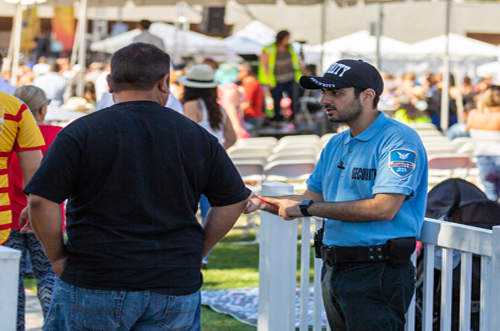
Over the last month, all of us have seen why it is so important to know how to de-escalate volatile situations. With security guards on the front lines, they’ve been able to meet the challenge. A large portion of security guard training is devoted to de-escalation techniques.
Security guards are trained to communicate effectively and persuasively when heated situations arise. Here are just a few scenarios where the training becomes critical—a customer becomes irate with an employee and threatens physical violence, a festivalgoer has had too much alcohol and becomes belligerent; a group of young people begins acting inappropriately in a shopping mall or at an outside gathering. If handled correctly, these situations can be diffused without use of physical force.
Communication Skills. A top security guard will be able to take control of a situation by verbally convincing individuals to behave properly and to follow instructions. Guards must make a quick assessment, understand the warning signs that could escalate a situation and use their verbal skills training to ensure an incident is resolved peacefully and safely.
Part of the California Bureau of Security and Investigative Services guard license training includes courses in verbal skills/crisis intervention, conflict management, speaking constructively, negotiating and verbal diffusion.
Participants in guard training learn how to approach an agitated individual and to communicate using verbal skills and physical mannerisms to calm down the situation. Security guards will face these scenarios throughout their guard career. They are challenging, get rewarding, when a situation that could have turned violent ends peacefully.
If you think you have what it takes to be a successful security guard, Access Control Security is hiring. For more information about online Access Control Security’s guard training, go to https://www.247GuardTraining.com.




Leave a Comment